
1/1/2007 - 1/10/2007
christopher funderburg
In October 2006, Funderburg and Cribbs set out to watch at least 200 movies over the course of the next 200 days. They both watched a different slate of films and wrote about every single one; from epic high art masterpieces such as Fassbinder's 15 & 1/2 hour Berlin Alexanderplatz to goofy teen comedies like Savage Steve Holland's worthy One Crazy Summer to idiotic dreck like Open Water 2. In sections spanning 10 days at a time, The Pink Smoke is reprinting their writings about the grueling experiment in cinematic endurance.
<<click here for 12/22/6 - 12/31/6>>
1.2.7. Flags of Our Fathers and Letters from Iwo Jima.
(35mm) at the JBFC.
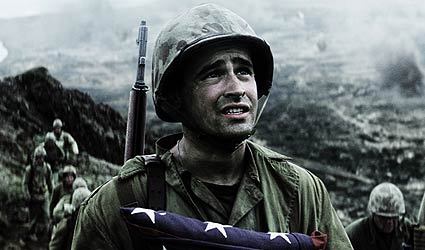
For a guy constantly praised for his old-school craftsmanship, Clint Eastwood sure has a lot of problems with weird tonal imbalances and embarrassing characterizations. Being an "old-school craftsman" would seem to imply that while his approach to filmmaking may be lacking in stylistic ambition, he makes up for it with a fundamental understanding of how to assemble solid cinematic structures: in theory, a craftsman's work is built like pick-up truck that isn't pretty, but will run forever. However, I don't really think that's all true with Eastwood – that reputation seems to be based more on his presence as an actor than his abilities as a filmmaker. For instance, Million Dollar Baby is severely marred by the Yosemite Sam-esque portrayal of the retarded young boxer and the embarrassing caricatures that were Hilary Swank's slovenly, transparently greedy clan. The wacky physical comedy of Eastwood and Company's lawmen is completely out of step with the rest of A Perfect World as well as a total failure on its own terms. The weird David Lynch-aping digressions to Kevin Bacon's wife's lips in Mystic River are as puzzling as Marcia Gay Harden's utterly unrestrained performance is goofily histrionic. And he has entire movies like Blood Work or Midnight in the Garden of Good and Evil that are nothing but cheesy misfires.
Whatever Eastwood may be, he's not a sure-footed Hollywood craftsman in the mold Anthony Mann or even his mentor Don Siegel – but that's not a bad thing. I think Eastwood is actually a far more idiosyncratic filmmaker than he will ever get credit for; he undoubtedly takes risks and mixes up the formula at least as often as he resorts to simply orchestrating the standard moves from the Hollywood Style playbook. Possibly, his reputation for craftsmanship comes from the fact that he doesn't have much of a knack for visual experimentation and the best his films have to offer are the so-old-school-it-hurts moments like the rainstorm in The Bridges of Madison County or the iconic line "kid, we've all got it comin'" in Unforgiven.
But really, Eastwood's latest project is a perfect example of the type of off-beat risks that few filmmakers are willing to attempt on a big budget: mirrored films chronicling the experience of U.S. soldier versus those in Japan during WWII. Even the more ostensibly predictable project, Flags of our Fathers, has the truly subversive message of "the pseudo-religious reverence for our soldiers is kind of a crock." Letters from Iwo Jima is the better film, but it also takes far fewer risks: it behaves like a prototypical war film in exactly the ways that Flags does not. Granted, it gets points for portraying the war from a Japanese point of view and the results are shockingly unflattering to America. There's a truly shocking scene in which a group of marines decide to simply execute some surrendered Japanese soldiers rather be bothered with taking them prisoner. It's all the more remarkable a scene because it doesn't have an exploitative feel – Eastwood clearly doesn't have an anti-war, anti-soldier bias, the moment is presented with the kind of off-handed truthfulness that's too unpleasant for many war movies to muster.
But a few individual scenes aside, Letters is not a particularly memorable film and it doesn't feel motivated by an interesting critique in the way that Flags of Our Fathers is driven by a will to pull apart the myths of heroism. Letters is the type of solid, workman-like movie that folks are always accusing Eastwood of making – but the fact that he made it at all, a film from the Japanese perspective, is a significant demonstration of his singularity as a filmmaker. Flags is the flip-side of that coin: it's all but ruined by a parade of bad performances and a lot of cheesy, on-the-nose dialog. It made me groan in a way that only a film to which I'm sympathetic can: the ideas behind it are smart; why are filmmakers expressing it so stupidly? The knee-jerk response would be to blame it all on Paul "Too-on-the-nose dialog is what I do" Haggis and, for once, I'm not disinclined to agree with the snap judgments that place the responsibilities for Flags' failures squarely on the shoulders of the man behind "Walker, Texas Ranger."
That said, for a man who claims to love jazz, Eastwood has a tin-fucking-ear – his problems with directing scenes of dialog should be as notorious as Dirty Harry's distaste for ketchup on a hot-dog. He's an odd director in that way: he's patient enough as filmmaker to let actors explore their roles and create memorable performances, but he's helpless to stop Jesse Bradford from being Jesse Bradford. Ryan Philippe and Paul Walker are also pretty awful in this movie, but only because they're miscast: it's hard to imagine the Greatest Generation as a bunch of pillow-lipped pretty boys with dreamy eyes. Where are Hollywood's new Robert Ryan and Lee Marvin? I'd even settle for this generation's Harry Andrews.
Anyway, Flags is also awkwardly structured and lopes along with virtually no narrative steam, which seems to be the result of having been based on a non-fiction book. You don't really have a sense of where it's all going and it piddles out pretty pathetically well before the end. But, as I said, it has a fierce intelligence about the ways in which wars are sold by soft-peddling the truth about life on the battlefield. As the protagonists become increasingly uneasy with their role as patriotic products being hawked on the home-front, they begin to question their understanding of their role in the world as they understood it back on the sands of Iwo Jima. The film has few easy answers and mines plenty of thoughtful ironies on the delineations between "true patriotism" and "patriotism as product." Eastwood is a cagey old man, too no-nonsense to swallow any of the simplistic bullshit on the irresolvable questions of war: his approach to making movies is accordingly provocative and unpredictable.
1.3.7. No movie?
For some reason, I didn't take notes for a couple weeks here and when I went back to write up the films, I couldn't remember what (if anything) I had seen. (After this batch of write-ups, though, the problem completely clears up).
1.4.7. The Curse of the Golden Flower.
(35mm) I believe this was at the Landmark Sunshine.
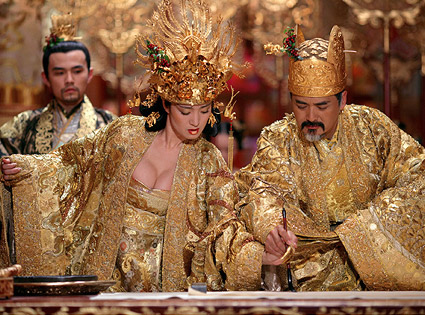
I'm sick of all of these Asian prestige pictures aping the Crouching Tiger, Hidden Dragon model – I didn't even like that movie. Granted, Golden Flower director Zhang Yimou was filming epically opulent, punishingly languid spectacles of dubious intelligence and negligible dramatic drive when Ang Lee was still ripping off Merchant Ivory's smaller scale opulence at the behest of Emma Thompson. Zhang Yimou (along with Chen Kaige) practically invented the genre of gorgeously photographed, impeccably production-designed courtly feudal drama that Crouching Tiger mashed up with mystical Jet Li head-kicking wuxia pian, so I guess he gets partial credit for stealing from the thief who robbed him first. It's like Robin Hood, only without Christian Slater. Anyway, I would watch Gong-Li and Chow-Yun Fat in anything, even if it starred Martin Lawrence in a fat suit, so I gave Golden Flower a go knowing full well that for me to enjoy it at all, it would have to be something other than what it appears to be.
Of course, it's exactly what it appears to be and nothing more. There's nothing offensive about it, unless you count wasting two of cinema's most naturally magnetic stars in roles that ask them to do little more than stand around with pained looks on their faces trying not to get crushed by their extravagant costumes. There are kings and princesses, warring kingdoms and noble suffering. It's all by the book with none of the heartfelt desperation and elegant poetry that made Raise the Red Lantern or Jou Dou seem like a lightning bolt of inspiration in their time. It's boilerplate classiness, predictable and tasteful with two actors who deserve better than being smushed beneath the rigidity of the template. I'd much rather see Chow take revenge on the man who insulted his rice. His rice is like family, you know?
1.5 – 1.6.7. I know I watched something here but what?
(weeks later I still can’t remember) I saw Perfume at some point around this time, but I thought I saw it before Letters from Iwo Jima (not that the films are related in any way other than through my memories)
1.7. Nowhere to Run.
(dvd) alone, in my darkened apartment.
Dudes of a certain generation will readily remember this Van Damme movie as "the one repeatedly featuring a stark naked Rosanna Arquette." Let's go all the way, indeed. However, it should be more correctly remembered as "that unfortunate Van Damme film with no action. The Van Damme film where the muscles from Brussels attempted maudlin, Joe Eszterhas-scripted drama. And kicked very few people in the head." Mr. J. Blake Fichera was kind enough to get me this film as a Christmas gift and I must say I'm glad to have seen it again. If you were curious what The Hitcher's director Robert Harmon directed besides that cult classic (and, incidentally, also why he never developed a cult reputation), then Nowhere to Run provides the answer. Also – hey, who's that playing the dreamy, blue-eyed villain? The handsome young fellow with a gravelly voice and a certain unrefined masculinity? Why, it's professional creepazoid Ted Levine! Alas, the film does nothing to clear up the mystery of just how many fucking Culkins there are floating around out there. Which one is Kieran again? This can't be the same kid that was in You Can Count on Me? Can it?
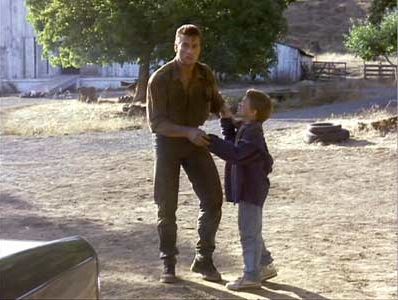 Anyhoo, this script was originally called Buddies and the film came out in between Basic Instinct and Sliver, i.e; at the height of Eszterhas' hack-y power. Don't worry, it delivers all of the hallmarks of Eszterhas: a leering, off-putting emphasis on voyeurism, over-ripe dialog, bucket-loads of hoary clichés (the real estate developers want to take away her house!), an aimless low-stakes plot (the real estate developers want to take away her house! at some point
whenever
you know, no biggie) and an almost pathological will to pander to the audience's most easily manipulated impulses (in this case, their sentimentality). Robert Harmon brings almost nothing to the table other than flipping the camera around spastically during the too brief, too infrequent "action" scenes and Rosanna Arquette must almost certainly rank this film among her greatest regrets.
Anyhoo, this script was originally called Buddies and the film came out in between Basic Instinct and Sliver, i.e; at the height of Eszterhas' hack-y power. Don't worry, it delivers all of the hallmarks of Eszterhas: a leering, off-putting emphasis on voyeurism, over-ripe dialog, bucket-loads of hoary clichés (the real estate developers want to take away her house!), an aimless low-stakes plot (the real estate developers want to take away her house! at some point
whenever
you know, no biggie) and an almost pathological will to pander to the audience's most easily manipulated impulses (in this case, their sentimentality). Robert Harmon brings almost nothing to the table other than flipping the camera around spastically during the too brief, too infrequent "action" scenes and Rosanna Arquette must almost certainly rank this film among her greatest regrets.
Van Damme what is there to say at this point? Is there any actor in history with less range? I love his star persona to death (and I yield to no one in my love of Knock-Off and Maximum Risk: The Other Side of Safe), but he literally is helpless to do virtually anything other than mumble in an impossibly thick accent, do a splitz and kick someone in the head. Films that do not play to these strengths are doomed. Nowhere to Run is almost epic in its miscalculation to cast Van Damme as a man escaped who redeems himself through the love of a simple country woman and her adorable moppets. Can I stress how boring it is to watch Van Damme act his way through a movie? Nothing ever really seems to register on his face and he has this weird little knot on his forehead. It's like watching someone act in slow motion. It's strange how much I enjoyed a film with literally nothing to recommend it. Other than a stark naked Rosanna Arquette. But gentlemen of a certain generation don’t need me to tell them about that.
1.8. Dreamgirls.
(35mm) City Cinemas Village East.
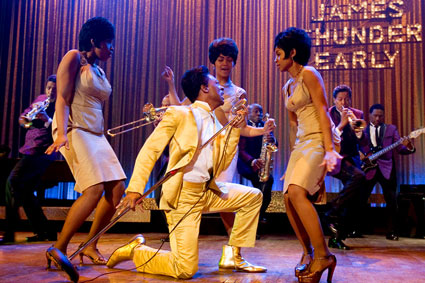
This movie is shrill, depressing and boring. I've never understood who it is that actually likes modern Broadway musicals, let alone the kind of pre-fab, soulless nonsense that is shit like Jersey Boys, Chicago and Dreamgirls: they exist on such a hollow plane of existence that it seems utterly impossible to have an human relationship to them. And - I state this for a fact - the music sucks. There's something inherently crappy about that "Broadway style" and the more a musical culls from the larger pop culture landscape the more it gets wrong. Case in point: the monumentally clueless Dreamgirls. Who is it that actually likes Jennifer Hudson's gauche, ostentatious blow-out performance of (one of the many) climactic ballads? Who likes these tuneless, forgettable songs delivered amidst the relentlessly, painfully unoriginal storylines?
This movie can't even really be classified as a failure because it seems to be everything it wants to be, it accomplishes exactly what it sets out to accomplish. And people keep buying tickets and it gets nominated for Academy Awards and Eddie Murphy's cipher of a performance is greeted as some kind of a comeback. The whole thing is presented with a knowing shorthand about what "musicals are like" and what "soul music is about," but it suffers from a schizophrenic-level of cognitive dissonance: it's the "knowing" movie that knows utterly nothing, the self-conscious pastiche without an ounce of self-awareness or shame, the calcified unfeeling melodrama. Who could possibly like this garbage?
The Prisoner: or How I Decided to Kill Tony Blair.
(Digibeta) at the Jacob Burns Film Center.
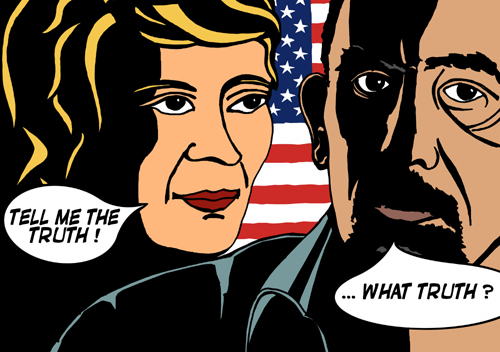
This is a heart-breaking documentary about an Arab journalist in Iraq accidentally imprisoned in Abu Ghraib – although "accidentally" is almost certainly the wrong way of putting it. Yunnis, the man imprisoned, tortured and humiliated is not there by mistake. He and his brothers are Iraqis accused of making bombs in their average, middle-class home. The marines arrest him without much of any evidence – actually, they have plenty of evidence in their mind: he once worked for the BBC and is therefore part of an international plot to kill Tony Blair. Seriously. You all know what happened at Abu Ghraib, so what happens next shouldn't be any kind of shock. This kind of zero tolerance, round-em-up, fascist military procedure is so obviously idiotic, cruel, and ineffective that I don't really have much of anything to say about it. As near as I can tell, there's never in the history of terrorism been an actual case of the infamous "ticking bomb" scenario: the hyperbolic situation that theoretically justifies torture and all manner of abusive, violent disgusting behavior and comprises the bulk of 24's plotlines.
When has the military ever come out and said, "there was a bomb about to go off, but we tortured some dude into confessing and we stopped that bomb that was literally about to blow up?" Even when supposed terrorist cells have been unearthed and brought to justice, they were always undone after months of traditional police work. Having military police piss on people or force feed them Korans hasn't done shit but make burning hatred of the U.S. military justified. It's such a sickening sham. Anyhoo, this movie is pretty good, but nothing too special – it's a lot of talking heads interviews spiced up with animated sequences literalizing the stories being told by various interview subjects. If you need further justification for being outraged by what's happening in the Middle East, this film is perfect fodder: a well-crafted, compelling bit of muck-raking reportage. It never transcends that level though and I'm not sure the filmmakers would even want it to. All things considered, I'd say you're better off just watching Lessons of Darkness again.
1.9. Blood Tea and Red String.
(16mm) Jacob Burns Film Center.
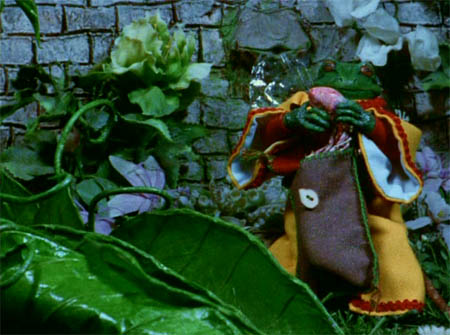
I've found that I'm running out of a little bit of steam here because there are so many films to write about right now that I already spoke about in my Year in Review 2006 article. Because of that, I just want to focus on one particular moment in this film. (some quick set-up: a family of rural, peasant bird-squirrel creatures has a strange doll stolen from them by aristocratic albino mice so the bird/squirrels go on a cross-country trek to retrieve the doll. It's stop-motion animation). At one point on the bird-squirrel's journey, they are enticed into a strange, stone maze/ruin: a bunch of berries appears at the entrance of the maze, so they approach it (presumably because they're hungry from travelin'). As they step up to the berries, the bunch suddenly disappears. They turn to leave, but the berries suddenly re-appear further down in the hall of the maze. They are once again attracted to the berries and go further into the maze. The berries disappear once again and then the whole process repeats itself until our heroes find themselves in an idyllic garden in the heart of the maze. Once in the garden they ingest some fruit and water that causes them to drift into a psychedelic slumber.
The sequence is one of the most unique and beautifully animated moments that I can recall ever having seen. The whole film has a delicate hand-crafted feel, but this particular section's mixture of the use of old-style camera tricks (such as double-exposure) and attention to the idiosyncrasies of the textures and designs of the actual physical material it's just ridiculously beautiful. Plus, the plot content is handled amazingly: it's both scary and weird because the heroes seem to be in danger, but it's also rendered in a soothing, hypnotic fashion that makes it seems like maybe something wonderful is about to happen. I won't spoil any more of the film; but if you haven't seen it yet, I demand you put it at the top of your queue.
1.10. No movie.
I really do get to 200 movies in 200 days, I swear.
<<click here for 1/11/7 - 1/20/7>>
home about contact us featured writings years in review film productions
All rights reserved The Pink Smoke © 2009